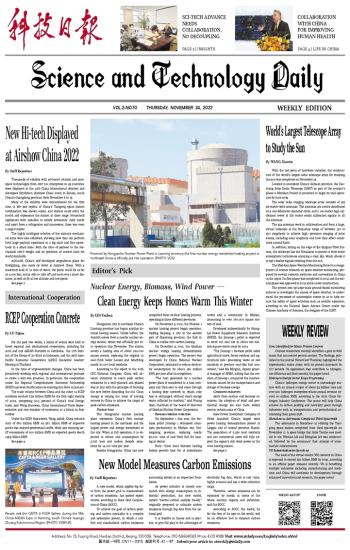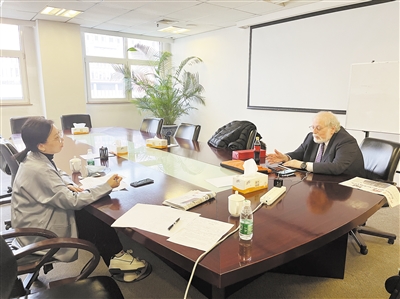
 Sci-tech Advance Needs Collaboration, No Decoupling
Sci-tech Advance Needs Collaboration, No Decoupling Collaboration With China for Improving Human Health
Collaboration With China for Improving Human Health New Hi-tech Displayed at Airshow China 2022
New Hi-tech Displayed at Airshow China 2022 RCEP Cooperation Concrete
RCEP Cooperation Concrete Nuclear Energy, Biomass, Wind Power —Clean Energy Keeps Homes Warm This Winter
Nuclear Energy, Biomass, Wind Power —Clean Energy Keeps Homes Warm This Winter World's Largest Telescope Array to Study the Sun
World's Largest Telescope Array to Study the Sun WEEKLY REVIEW
WEEKLY REVIEW New Model Measures Carbon Emissions
New Model Measures Carbon Emissions Contact us
Contact us
Sci-tech Advance Needs Collaboration, No Decoupling
 |
What are the key issues that stand out when international scholars review the China-U.S. sci-tech agenda for 2022: The China Initiative, The CHIPS and Science Act (The Chip Act) or sci-tech decoupling between the two countries?
"We need to evolve into a win-win framework to ensure both sides can benefit from the collaboration. China and the U.S. need to find an intermediate point, where both sides can be accommodated," said Professor Dennis Simon, the senior adviser to the President for China Affairs at Duke University, during a wide-ranging interview with Science and Technology Daily on November 10.
A new agreement to be expected
Over the last 40 years, the China-U.S. collaboration involving universities, research institutes, think tank, and researchers has far surpassed what the government to government agreement ever imagined, Simon said.
"We must come back to the table as soon as possible and restore the discussions about what we specifically need to fix or improve," he noted.
Public diplomacy in sci-tech or people-to-people diplomacy in sci-tech is something both the two countries ought to pursue because of the potential synergies and mutual benefit. For this purpose, Simon gives two suggestions.
Firstly, the Chinese universities and the American universities ought to build a consortium so they can discuss problematic areas. Under this consortium, they can define the rules of going forward and preempt new problems before they occur.
Secondly, we need an entirely new sci-tech agreement, one that can address prevailing concerns upfront. Let's call it, "Sino-U.S. S&T Cooperation, 2.0". The proposed new agreement should include reference to the critical issues and problems that emerged over the last 40 years and provide correctives for them.
The two countries could make new explicit commitments so that there would be reciprocal guarantees about maintaining the integrity of the agreement. The new agreement could reflect a new set of targets for cooperation reflecting the current agenda, for example, dealing with major global challenges.
"If the two countries come to that agreement together, I think both the two countries would have a new era of 40 years of very fruitful collaboration," said Simon, adding that looking forward is needed and no looking back.
Damage outweighs benefits
The Chip Act has some punitive aspects to restrict access of China not just to chips, but also the production equipment that is used to make semiconductors.
"I believe very firmly that this kind of policy is going to be more damaging than beneficial to the U.S.," said Simon.
We live in a globalized world, and new knowledge and information are generated today through cross border collaboration and trans-national knowledge networks, he said, adding that China is now an established player in terms of these transnational networks, such as the numbers of co-authored articles which Chinese and international scholars have produced.
"So I think the benefits of collaboration and cooperation outweigh the damages," he said, noting that the whole logic of the so called "China threat" doesn't make much sense as one of the principal elements shaping U.S. foreign policy.
First of all, China is the largest market for semiconductors in the world, and it will continue to be the largest semiconductor market for the next five to 10 years at least. There are major profits of tens or hundreds of millions USD that U.S. semiconductor industry is going to be earned from China's growth in the semiconductor industry.
Secondly, China is very good at technology application. It has already shown some innovative capabilities regarding chip technology that are used in electric and autonomous vehicles. The world can benefit from China's innovation. By restricting China's access to technology, we are limiting the overall innovation potential as well.
Finally, something the U.S. has to realize is that it can benefit more from cooperation with China than it can from trying to contain China through the current array of restrictive policies and regulations.
The lingering impact of The China Initiative
When talking about the restrictiveness, Simon said at present we can already see that Sino-American university collaboration has been damaged by the events of the last four or five years.
The most typical U.S. government policy, of course, has been The China Initiative released by the U.S. Department of the Justice.
Even though The China Initiative was terminated in early 2022, its lingering effects continue to be felt throughout the U.S. academic community and in particular among Chinese-American scientists.
It continues to be felt in China as well. Many Chinese scientists who might want to come to the U.S. now have some trepidation: will they be safe, will they be accused of being a spy, etc.
So, it has chilled U.S.-China academic collaboration. In fact, Simon stated, "the American academic community does not want to curtail engagement with China."
"Collaborative research has turned out to be very beneficial and increasingly beneficial over time," he said, adding that, "China is able to be a contributor as a fully-fledged member and the benefits to be shared are potentially significant. So we must figure out a way on how to rebuild the trust and confidence and improve communication about how we can work up together."
Moreover, Simon pointed out, it simply does not make sense for the U.S. to disengage from China precisely at a time when China's advancing S&T capabilities could add a great deal of value-giving real meaning to the concept of mutual benefit.
This article is contributed by Chinese Academy of Science and Technology for Development.
"We need to evolve into a win-win framework to ensure both sides can benefit from the collaboration. China and the U.S. need to find an intermediate point, where both sides can be accommodated," said Professor Dennis Simon, the senior adviser to the President for China Affairs at Duke University, during a wide-ranging interview with Science and Technology Daily on November 10.
A new agreement to be expected
Over the last 40 years, the China-U.S. collaboration involving universities, research institutes, think tank, and researchers has far surpassed what the government to government agreement ever imagined, Simon said.
"We must come back to the table as soon as possible and restore the discussions about what we specifically need to fix or improve," he noted.
Public diplomacy in sci-tech or people-to-people diplomacy in sci-tech is something both the two countries ought to pursue because of the potential synergies and mutual benefit. For this purpose, Simon gives two suggestions.
Firstly, the Chinese universities and the American universities ought to build a consortium so they can discuss problematic areas. Under this consortium, they can define the rules of going forward and preempt new problems before they occur.
Secondly, we need an entirely new sci-tech agreement, one that can address prevailing concerns upfront. Let's call it, "Sino-U.S. S&T Cooperation, 2.0". The proposed new agreement should include reference to the critical issues and problems that emerged over the last 40 years and provide correctives for them.
The two countries could make new explicit commitments so that there would be reciprocal guarantees about maintaining the integrity of the agreement. The new agreement could reflect a new set of targets for cooperation reflecting the current agenda, for example, dealing with major global challenges.
"If the two countries come to that agreement together, I think both the two countries would have a new era of 40 years of very fruitful collaboration," said Simon, adding that looking forward is needed and no looking back.
Damage outweighs benefits
The Chip Act has some punitive aspects to restrict access of China not just to chips, but also the production equipment that is used to make semiconductors.
"I believe very firmly that this kind of policy is going to be more damaging than beneficial to the U.S.," said Simon.
We live in a globalized world, and new knowledge and information are generated today through cross border collaboration and trans-national knowledge networks, he said, adding that China is now an established player in terms of these transnational networks, such as the numbers of co-authored articles which Chinese and international scholars have produced.
"So I think the benefits of collaboration and cooperation outweigh the damages," he said, noting that the whole logic of the so called "China threat" doesn't make much sense as one of the principal elements shaping U.S. foreign policy.
First of all, China is the largest market for semiconductors in the world, and it will continue to be the largest semiconductor market for the next five to 10 years at least. There are major profits of tens or hundreds of millions USD that U.S. semiconductor industry is going to be earned from China's growth in the semiconductor industry.
Secondly, China is very good at technology application. It has already shown some innovative capabilities regarding chip technology that are used in electric and autonomous vehicles. The world can benefit from China's innovation. By restricting China's access to technology, we are limiting the overall innovation potential as well.
Finally, something the U.S. has to realize is that it can benefit more from cooperation with China than it can from trying to contain China through the current array of restrictive policies and regulations.
The lingering impact of The China Initiative
When talking about the restrictiveness, Simon said at present we can already see that Sino-American university collaboration has been damaged by the events of the last four or five years.
The most typical U.S. government policy, of course, has been The China Initiative released by the U.S. Department of the Justice.
Even though The China Initiative was terminated in early 2022, its lingering effects continue to be felt throughout the U.S. academic community and in particular among Chinese-American scientists.
It continues to be felt in China as well. Many Chinese scientists who might want to come to the U.S. now have some trepidation: will they be safe, will they be accused of being a spy, etc.
So, it has chilled U.S.-China academic collaboration. In fact, Simon stated, "the American academic community does not want to curtail engagement with China."
"Collaborative research has turned out to be very beneficial and increasingly beneficial over time," he said, adding that, "China is able to be a contributor as a fully-fledged member and the benefits to be shared are potentially significant. So we must figure out a way on how to rebuild the trust and confidence and improve communication about how we can work up together."
Moreover, Simon pointed out, it simply does not make sense for the U.S. to disengage from China precisely at a time when China's advancing S&T capabilities could add a great deal of value-giving real meaning to the concept of mutual benefit.
This article is contributed by Chinese Academy of Science and Technology for Development.

 Next
Next



